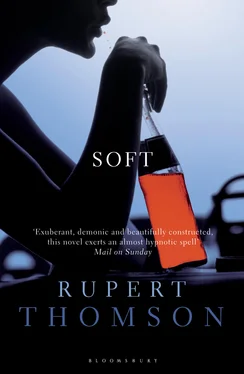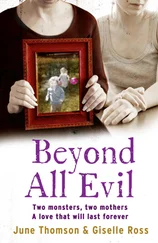At ten o’clock he dialled Ray’s mobile number. He could only hear Ray faintly through a cloud of static. Still, he didn’t waste any time in coming to the point.
‘You know what they want me to do, Ray?’
Ray didn’t answer.
‘That job you got me, Ray, you know what they want me to do?’
‘They didn’t tell me.’
‘They want me to kill someone. Did you know that?’
‘I told you. They didn’t tell me.’
‘Well,’ Barker said, ‘now you know.’
An image came to him suddenly, another fragment of the past. He had been standing outside a club a year ago, Ray on the pavement beside him wearing a shiny black jacket with the snarling head of a tiger on the back. ‘I heard you did one of the Scullys,’ Ray had said. Barker asked him where he’d got that from. Ray shrugged. ‘The word’s out.’ Barker pushed Ray up against the wall, knowing Ray could throw him ten feet whenever he felt like it. ‘I’ll tell you what the word is, Ray. The word is bullshit. You got that?’ Ray had nodded — OK, OK — but he obviously hadn’t believed what Barker was saying. Which meant he could be lying now.
Why, though? Why would he lie?
The static cleared and he could hear Ray breathing on the other end. He could hear a TV in the background too. They were both watching the same channel. It gave Barker a peculiar feeling. The feeling, just for a moment, of being everywhere at once. Like God.
‘You see, strange as it may fucking sound,’ he said, ‘I never killed anyone before. Not even by accident.’
Ray began to talk. ‘Jesus, Barker, if I’d known what the job was, do you think I would’ve —’ and so on.
After a while Barker just cut him off. ‘Got any ideas, Ray, for how to kill a girl?’
Barker listened to Ray breathing, the TV in the background and, beyond that, the eerie hollow space inside a phone line.
‘No,’ he said. ‘I didn’t think so.’ He lit a cigarette and bounced the smoke off the wall above the phone. ‘Tomorrow, Ray,’ he said, ‘tomorrow you should go down the Job Centre and ask them to take you on. They should stick you behind those fucking windows. Because you’ve got a real talent for finding people work, you know that? A real fucking talent. And something everybody knows, Ray, everybody knows, talent should not be fucking wasted. All right?’
Barker slammed the phone down. From the quality of the silence that descended all around him he guessed he must have been shouting. Towards the end of the call, at least.
He walked back into the lounge. On the table he saw the photograph of Glade Spencer. He picked it up and tore it into pieces. Dropped the pieces in the bin.
On the tube Glade fell asleep, as usual. She had worked six shifts that week, including a double shift the day before, so perhaps it was no wonder she was tired. When she first left art school she had waited tables at a café in Portobello Road, but then, six months later, she had got a job at a small but fashionable restaurant in Soho, and she had been there ever since. She liked the place as soon as she walked in; though it looked formal — the starched white tablecloths, the low lighting, the slightly malicious gleam of cutlery — it didn’t feel tense. The hours were longer, of course, and she had to travel further, but she earned good money, never less than two hundred pounds a week including tips — and anyway, what else would she have done?
She woke as the tube was slowing down. Her head felt numb and foggy. Turning round, she peered out of the window. The line had climbed into the daylight, though the towering embankment walls and cantilevered walkways of the station made a gloom of it, an underworld of gravel, weeds and shadows. Paddington. Four stops to go. As the tube clattered on, she glimpsed a stretch of barren land to the north, beneath the blunt, pale pillars of the Westway. This was a place she often thought about — a kind of sacred ground.
Four years before, on her nineteenth birthday, she had invited some people to her room on Shirland Road, which was where she lived at the time. They drank Lambrusco out of plastic glasses and then, at midnight, she opened the door to her wardrobe and reached inside. The rocket she drew from the darkness behind her clothes was almost as tall as she was, the blond stick slotting into a heavy blue cylinder that had a pointed scarlet top to it. It had cost eight pounds, and she had kept it hidden in the wardrobe since November.
That night they walked down Shirland Road, talking and laughing and smoking cigarettes, three or four girls from art school, and Charlie Moore, who was Glade’s closest friend. The girls were wary of Charlie, she remembered, one of them whispering about his hair, how it looked like stuffing from a sofa, another wondering why he hardly ever spoke. Shirland Road opened into Warwick Avenue, Glade leading the way. Warwick Avenue — so wide and spacious suddenly, with that church at one end, like a ship, somehow; she always imagined sea in front of it instead of road. Sometimes she sat outside the pub and drank a half of cider or Guinness, and she watched the church sail right past her, white spray breaking over the high porch, soaking the dull brick walls. On that night, though, the moon was almost full and in the aluminium light the church looked as if it had been moored, it looked anchored, and they walked on, past the grand houses, shadows draped over the cream façades like black lace shawls. Something seemed to snatch at her when she stared in through those windows, their curtains tied back with silk cords and their lights switched on, the edges of amber lampshades intricate with tasselled fringes, and deeper into the rooms, gold mirrors over fireplaces, sofas, Chinese vases. Something seemed to snatch at her insides and twist. Then one of the girls touched her elbow, asked where they were going.
‘The mountain,’ she said.
She ran over the main road and, climbing through a fence of corrugated iron and barbed wire, slid down a bank of grass and rubble on to the flat land behind Paddington Station. The noise down there surprised her. The rush of traffic from the Westway overhead, the strange mingled hiss and whine as trains leaving the station gathered speed. She stood at the foot of the mountain and looked up. Mud, as she had always thought. By now the others had caught up with her, Charlie at her shoulder, the corner of his mouth puckered, slightly crooked, perhaps because he had guessed what she had in mind. One of the girls had torn her skirt. She was laughing, her mouth stretched wide, her pale sixties lipstick almost phosphorescent in the half-light. Glade explained her plan. They had to climb the mountain, all of them. It was from there that she was going to let the firework off.
At the top and panting, out of breath, she felt much closer to the sky, as though she could reach up and touch it, the mass of brown cloud that covered London, tawdry and crumpled as jumble-sale velvet. She could see a train stumbling like a drunk in the maze of tracks outside the station, only the windows visible, a murky row of yellow squares. Each square had faces in it, looking out, going home, and she thought of her father, who lived in a caravan in Lancashire, her father’s face in that single melancholy window, one yellow square in the darkness of a field. She bent down. Pushing her hair behind her shoulder, she worked the tail of the rocket into the mud until it stood up on its own. She asked if anyone had matches. Charlie handed her a battered Zippo lighter. She snapped the lid back, thumbed the flint and held the trembling flame against the touchpaper. For a moment nothing happened. Then it caught. At first it burned modestly, innocently, as if it was just ordinary paper and would soon falter, die out, crumble into harmless ash. The flame had an odd greenish halo, though. Somebody yelled at her. Get down .
Читать дальше












